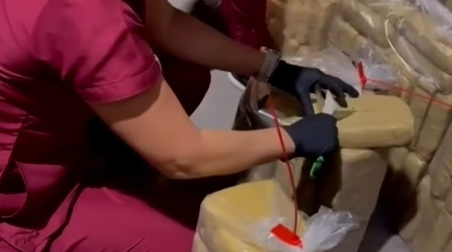It’s a hot May afternoon and Brian Turner hasn’t had breakfast or lunch. He maybe he can eat something tonight.
This 49-year-old man lives with his dog Rocky in a cozy apartment on the ground floor of a building located in the town of Ipswich, in the east of the United Kingdom.
6-year-old Rocky is central to Turner’s life.
He was purchased as a puppy by him and his partner Paula Macintosh.
Turner, a trained bartender, put his career on hold in 2009 to care for Macintosh, who had serious mental health issues.
In 2019, one night in February Paula died in her sleep due to a previously undiagnosed heart condition.
He was 54 years old.
A few months later, Turner’s mother, Maureen, died.
And later the global pandemic of covid-19 would be unleashed.
“It’s been tough,” Turner says.
Macintosh photographs take pride of place on a side table and a small wicker basket containing his ashes sits on the windowsill.
For years, Turner has managed to survive on very little money.
Check prices at multiple stores regularly, scan the discount food sections of supermarkets, and buy in bulk when possible.
Since his partner’s death, he has managed to buy enough food for himself and Rocky for only about $50 a month.
But rising food prices and bills are making living on that amount no longer possible.
“Since we came out of confinement, costs have tripled,” he says. “The cost of living has skyrocketed.”
“I have to ask for help from neighbors, friends and family.
“I have used the food banks several times.”
He gets about $800 a month in universal credit, the British government’s payment to help with the costs of living.
Your monthly expenses are:
“When I go to Citizens Advice for food, they tell me that they are limiting the number of food packages that I receive to make sure that the distribution is fair for everyone, so that it is not like a weekly purchase for anyone.
“Sometimes I have to search and search.”
And because it’s far from alone in financial difficulties, competition in the discount food sections has become fierce.
“There are more people who have the same thing happen to me,” he says.
He was diagnosed with epilepsy and takes migraine medication. Turner’s attempts to get a job have been unsuccessful.
There was a time when I was filling up to 15 applications a day for everything from catering to office work, but none were successful.
“I talked to some employers and they turned around and told me that due to liability insurance they couldn’t hire me because of my health problems,” he says.
“A part of me wants to go back to work because of the cost of living and all that, but there’s another part of me that tells me it’s better to stay safe than to be sorry.”
Almost all of the money you have left over when you pay your bills goes toward food.
But what he spent on food a year ago has doubled and he now spends about $100 compared to $50 a month before.
As a result, she only has enough cash to buy food for a week and a half each month.
“There are days when I only have one meal a day; I’m not supposed to because of the medication I’m taking, which I have to take with or around meals. Sometimes it has an impact on the medication.”
However, Rocky’s feeding routine has not been affected by rising costs.
“There are days that I prefer my dog to eat and not me.”
Asked if he would ever give up Rocky to save costs, he replied that “he’s the only thing” keeping him going.
“He’s the kind of dog that if you want and need a hug, he’ll come and give you a hug.
“I have to go without food to pay for his and I have enough for him right now to get me through a good couple of months. After that, I don’t know what I’ll do.
“If it hadn’t been for him, I definitely would have lost my sanity.
“A lot of people I’ve talked to are struggling as well.
“I would like parliamentarians to try to live with universal credit for three months, they would end up realizing that it is not enough to survive.”
The government said it understands the pressures people are currently facing with the cost of living.
Like a growing number of people in the UK and around the world, Turner’s worries about his finances have become “constant”.
“People trust us more and more on a regular basis,” says Sally Harrison, professional services manager for Ipswich Citizens Advice.
“They used to come to us looking for a food bank when they were having a particularly rough month.
“Now it’s becoming the norm. They come to us every month because they can’t pay their bills.
“People are worried and panicking because they have seen the huge increases in energy prices,” he explains.
Asked how he would pay travel costs to spend a day away from Ipswich just for fun, Turner said: “That’s not going to happen.”
The last vacation he had was in 2015, when he went away for a long weekend to meet up with some family members.
He can’t afford to hop on a bus into central Ipswich for a single errand, he says.
You need to have several reasons for going to town to justify the expense.
Before her death, Paula had told Turner that she wanted her ashes scattered at sea.
His last request is still on Turner’s mind.
The truth is, you just can’t afford the costs of renting a boat or traveling to shore right now.
“I can’t do that yet,” he admits.
“When things settle down, we’ll think again and go out and scatter his ashes.”
Now you can receive notifications from BBC World. Download the new version of our app and activate it so you don’t miss out on our best content.
BBC WORLD

















